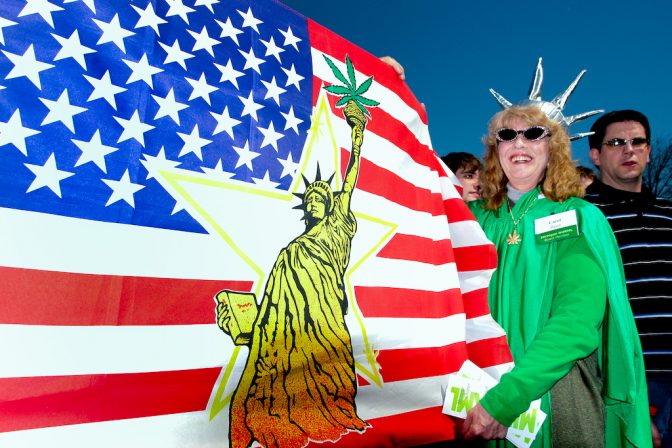On Election Day, Marijuana Legalization Sweeps the Nation

On Nov. 8, voters in eight states expressed widespread approval for cannabis legalization. Five states voted on adult-use legalization, which was defeated only in Arizona, and four states voted on and passed measures to legalize medical marijuana legalization across the country.
While it’s unclear how Donald Trump’s presidential stunning upset over Hillary Clinton will affect federal cannabis reform, the state results signal a tipping point for state-legal cannabis, and will have international implications.
The most important measure was in California, where 55.8% of voters approved Proposition 64. Adults (21 and older) can now possess up to an ounce of cannabis in California, which boasts a population of nearly 40 million and has the largest economy of any U.S. state.
In 1996, California was the first state to legalize medical marijuana and already has a legal medical cannabis market estimated at $2.7 billion. Despite opposition from many in the medical marijuana industry, full legalization signals a shift after a similar measure was rejected six years ago. Advocates are hopeful that it will spur reform on the federal level. It also likely to affect the policies of other nations, especially for Mexico.
Another important win for cannabis legalization came in Massachusetts, where 53.6% of voters approved Question 4 to legalize adult use. Also in New England, Question 1 in Maine passed but barely with 50.3% of the vote to legalize adult use.
The East Coast has lagged far behind the West when it comes to cannabis policy reform. Since many Eastern states lack the provisions for ballot initiatives, legalization in Massachusetts could spur other state legislatures to act.
“It’s an important benchmark for the movement,” says Tom Angell, Chairman of Marijuana Majority.
Nevada added another draw for tourists, with 54.5% of voters approving Question 2. Now, visitors to the state can enjoy legal cannabis alongside a myriad of entertainment options. Legalization passed despite strong opposition from casino magnate and Las Vegas Review-Journal owner Sheldon Adelson, who gave gave $2 million to the No on 2 effort.
Nevada’s neighbor, Arizona, was the only state to reject a cannabis ballot measure this election, when 52.2% voted against Prop 205. Angell blames the defeat on “huge and unseemly contributions to the opposition campaign from Big Pharma [Insys], a company that makes money selling food to prisons [Services Group of America] and a casino billionaire [Adelson, who gave $500,000].”
In a boon for patient access, all four states with medical marijuana ballot measures voted to approve them. In Florida, medical marijuana passed with 71%, a huge victory in a state where a similar measure was defeated two years ago with just 58% (60% is needed to pass).
The passage of Issue 6 in Arkansas also marks a turning point: it became the first Bible Belt state to legalize medical marijuana with 53.2% voting in favor of the measure. In North Dakota, voters overwhelmingly approved Measure 5 with 63.7% support. “Very few people expected this result, and it happened with almost no coordination or major assistance from national organizations,” Angell adds.
And last but certainly not least, 57% of voters in Montana approved Initiative 182. Voters passed medical cannabis in 2004, but in recent years, the state legislature and supreme court have rolled back the program. Following a legislative battle, the court limited registered medical marijuana providers to three patients each, causing providers to shut down and patient numbers to drop substantially. The passage of Initiative 182 essentially re-legalizes medical marijuana in the state.
With these ballot initiative successes, eight states now have legal adult-use and 29 states have legal medical marijuana, continuing a trend of legalization across the country.
“Voters across America have once again proven that cannabis legalization is not only a moral imperative, it’s also extremely popular public policy,” says David Bienenstock, Head of Content at High Times. “No longer can our elected officials defend the government’s self-destructive and utterly failed War on Marijuana… This in many ways is like the end of alcohol Prohibition in 1933—except now we can party all night and not have hangovers in the morning.”
Trump’s shocking victory over Clinton in the presidential election has left some advocates worried. New Vice President Mike Pence has a history of opposition to cannabis reform; in 2014, he fought against a legislative effort to lower penalties for pot possession.
«[Trump’s] most likely appointees to senior law enforcement positions—Rudy Giuliani and Chris Christie—are no friends of marijuana reform,» says Ethan Nadelmann, Executive Director of the Drug Policy Alliance.
However, Angell remains hopeful: “President-elect Trump has clearly and repeatedly pledged to respect state marijuana laws, and we fully expect him to follow through on those promises.”

